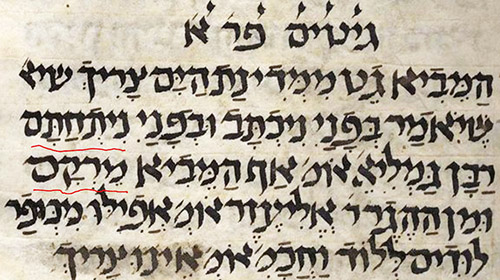
As I write this, we approach Shavuot, celebrating the giving of the Torah from Hashem to Israel. Midrashim consider Matan Torah to function conceptually as a marriage between Hashem and klal Yisrael, with Moshe functioning as an agent. We also begin masechet Gittin, and my thoughts are on agency, the trustworthy transmission of the mesorah from Moshe on Sinai, and adaptations over the years within this trustworthy transmission.
The mishna (Gittin 2a) sets out how an agent from an overseas country must declare בְּפָנַי נכתּב וּבְפָנַי נחתּם—“it was written before me and it was signed before me.” A quick question to discuss with your family and friends before proceeding: How would you personally pronounce נכתּב and נחתּם in this utterance?
The grammatically correct pronunciation would be נִכְתַּב, with a chirik under the nun, and נֶחְתַּם, with a segol under the nun. For nichtav, it is because it is the nifal, passive, “it was written,” and the regular pattern for this is to place a chirik. For נֶחְתַּם, the chirik is changed to a segol under the influence of the guttural ḥet.
However, there’s a strong likelihood that you pronounced both with a segol, nechtav and nechtam, despite nechtav being (strictly speaking) ungrammatical. Not only that, but we are beginning Gittin just as Yeshiva University is finishing Gittin, so there are many recent and relevant Gemara shiurim on YUTorah.org. Here’s a fun exercise: Search through their 315, 143+ shiurim for “nichtav” (six results) and “nechtav” (47 results). Okay, maybe that just reflects the talmidim writing the shiur titles (e.g. “Gittin 2a—Befanai Nechtav”), or the metadata (e.g. topics: Gittin, Bephanai, nechtav). But then listen carefully to the shiurim, including some by major talmidei chachamim, and you’ll distinctly hear “nechtav.” Don’t worry, Rabbi Jeremy Wieder will always say “nichtav” correctly. Rabbi Aryeh Lebowitz pronounced it “nechtav” seven years ago, but two of the six results were last Thursday’s Daf Yomi shiur, where he carefully enunciates it as “nichtav.”
There are good reasons for this widespread pronunciation. Foremost, this is how your rebbe and classmates probably pronounced it when you learned Gittin, and so you’ve internalized it. Also, most normal people aren’t grammarians, and are not thinking about grammatical forms. If they aren’t native Hebrew speakers such as Israelis, they will be subject to phonological influences.
The segol and chirik chaser are similar vowels. Also, the first word, “nichtav” and the second word, “nechtam,” sound very similar. Especially for Ashkenazi Jews who pronounce both chet and chaf as the voiceless uvular fricative, the only difference is the final consonant vet or mem, which should not influence the word-initial vowel. The “nechtam” stands out as strange, and it dragged the “nichtav” along with it. There is a phonological phenomenon called “vowel harmony” in certain languages—such as Turkish and Finnish—where vowels assimilate to be members of the same natural class. This occurs where the vowels are at a distance, separated by intervening segments. We might describe “befanai nechtav” as the result of vowel harmony with the vowel in “nechtam.”
The vocalized Kaufmann manuscript has a few interesting features. The scribe wrote ניכתב with a full yud, which certainly could help us avoid the segol, and ניתחתם as a passive or reflexive. Also, the Nakdan wrote רְקָם for the first place name, versus חֶגֶר. I’ve often heard this as “rekem” and “cheger,” so I wonder if that’s also due to vowel harmony.
Prescriptivism and Descriptivism
One can take either a prescriptive or descriptive approach to linguistics. A prescriptivist would assert that there is a pure, correct phonology and syntax for a language, and would then say that a word, or sentence is ungrammatical. You can find this approach in school, when your English teacher corrects your essay because you employed a sentence fragment, or used a dangling modifier. So too, in a style guide. A descriptivist would simply describe the language as it exists, as it is used, and say “Hey, people in the United States will often use the dangling modifier.”
Consider the word “irregardless.” Is it a real word? There is a real word “irrespective” and a synonym, “regardless.” Many people mentally merged the words and fabricated the nonsensical “irregardless”. (One problem with the word is that it contains a double negative, the prefix “ir” and the suffix “less.”) A teacher or grammarian might frown upon the word. The Chicago style guide declares that it’s an error, and suggests using “regardless” or “irrespective” instead. Many dictionaries such as the Oxford English Dictionary include it, though often they will mark it as nonstandard. Most modern linguists are descriptivists.
My own perspective is a mix of descriptivism and prescriptivism. I certainly consider some utterances incorrect. I get especially annoyed when people hypercorrect, by misapplying a grammar rule. For instance, “I” is the nominative pronoun while “me” is the accusative. “Bob and I ate the cookies” is correct, not “Bob and me ate the cookies,” because if you remove “Bob,” you wouldn’t say, “Me ate the cookies,” like the cookie monster. A teacher corrected some kid, who is now a shul president and says the incorrect and formal, “Please see the rabbi and I,” even though if one would remove the rabbi, you’d be left with the obviously incorrect “Please see I.” That isn’t the way people would naturally say the sentence.
I do wince at “irregardless.” However, I also recognize broad shifts in correct speech among groups across time and space. Americans will write “color” rather than the British “colour.” An American accent differs from a British one, and a Chicagoan accent from a New York accent. Words experience semantic shifts over time, as “awful” originally was a synonym for “awesome,” but now means terrible.
Acceptable in Context
My particular blend is to judge an utterance as grammatical or the reverse based on the standards adopted by his/her specific group. Many Ashkenazim distinguish between tav and sav, so if the Chazan says “malchuto” while in every other context pronounces the sav, perhaps that is an error; a Sefardi pronouncing “malchuto” is totally fine, but she shouldn’t say “mulchuso” …
Hebrew has changed over time—from Biblical Hebrew to Middle Hebrew, from Rabbinic Hebrew to Modern Hebrew. There was Biblical Aramaic, but also Babylonian Aramaic and Galilean Aramaic. And Galilean Aramaic has all sorts of interesting features like relaxation of gutturals (so that “mar” is how they might pronounce “amar”). In Brachot 32a, after a drasha in which אֶל is reread as עַל, the Gemara comments how in Rabbi Eliezer ben Yaakov’s academy, they would consistently mix their ayins and alephs. There can be mesorah even in mispronunciations.
For our own pronunciation of “nichtav/nechtav,” and what can be heard on YUTorah, we need to realize that what is spoken is Yeshivish. This is a language just like Galilean Aramaic is a language. Within that language, it is entirely in bounds to pronounce Hebrew and Aramaic words as they do—to say “migu” rather than “migo,” and to stress the penultimate rather than ultimate syllable in discussing dikduk instead of dikduk.
Finally, the mishna in Eduyot 1:3 relates הִלֵּל אוֹמֵר: מְלֹא הִין מַיִם שְׁאוּבִין פּוֹסְלִין אֶת הַמִּקְוֶה, אֶלָּא שֶׁאָדָם חַיָּב לוֹמַר בִּלְשׁוֹן רַבּוֹ. Hillel said that a full “hin” of drawn water invalidates a mikvah, but a person needs to say it in his teacher’s language. Rambam quoted an explanation from his father, who heard from his teacher, who heard from his teacher (and thus, a masorah): Shemaya and Avtalyon, who were Hillel’s teachers, were converts and therefore couldn’t pronounce the letter heh. Hillel was fully capable of pronouncing a “heh,” but would refer to the measure as an אִין. My own rabbeim always said “nechtav,” with a segol and stress on the penultimate syllable, so, perhaps, I am obligated to say it that way as well.
Rabbi Dr. Joshua Waxman teaches computer science at Stern College for Women, and his research includes programmatically finding scholars and scholastic relationships in the Babylonian Talmud.













